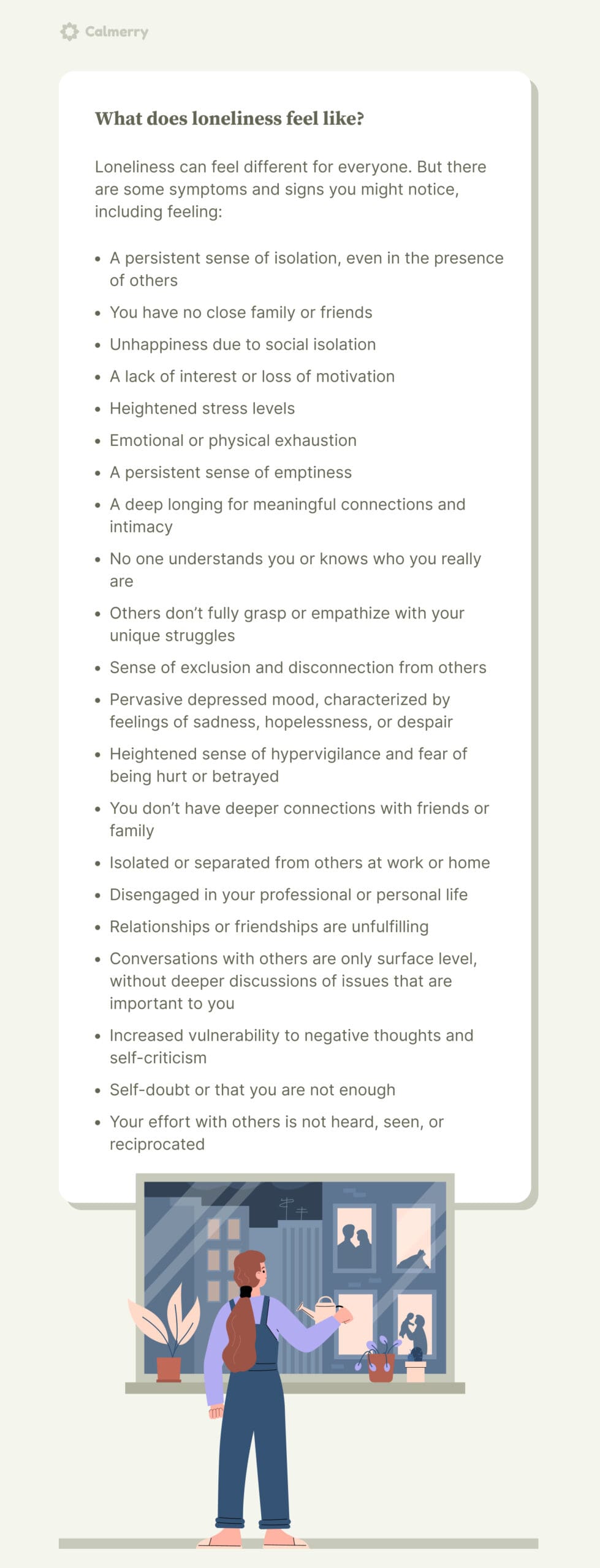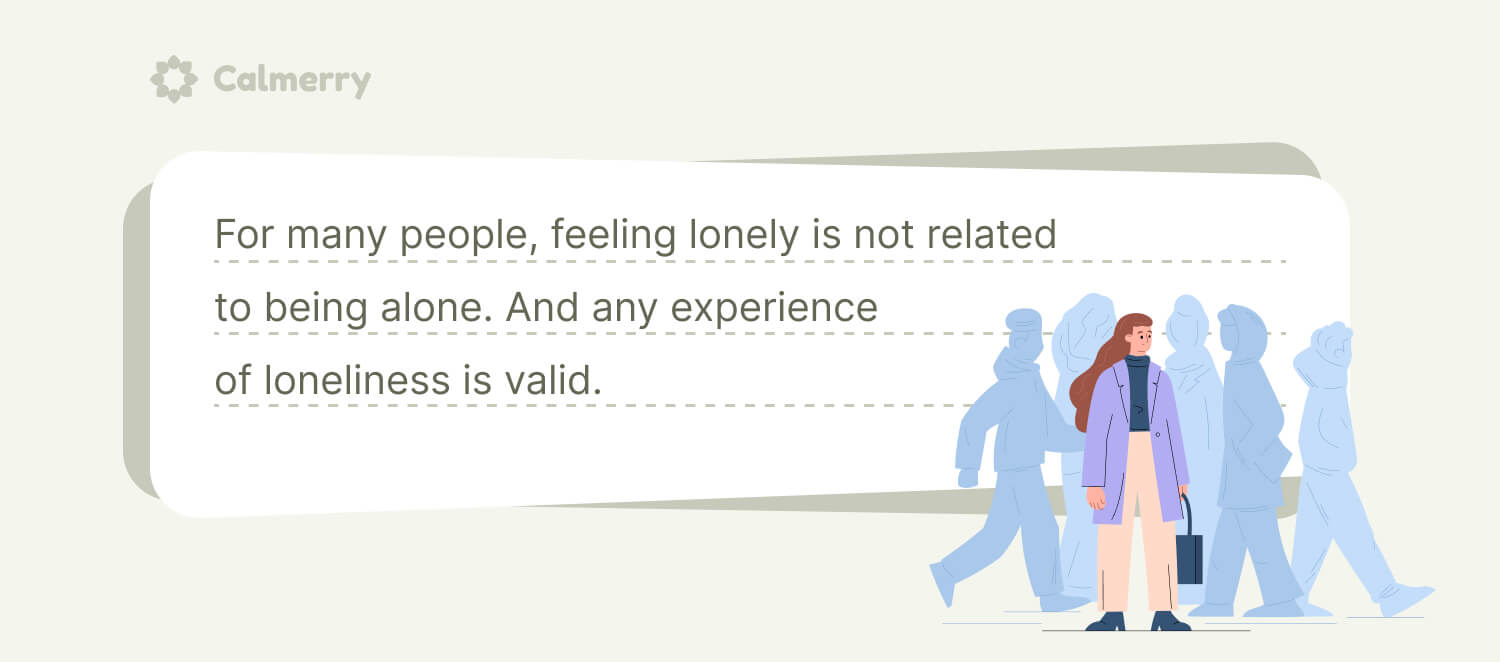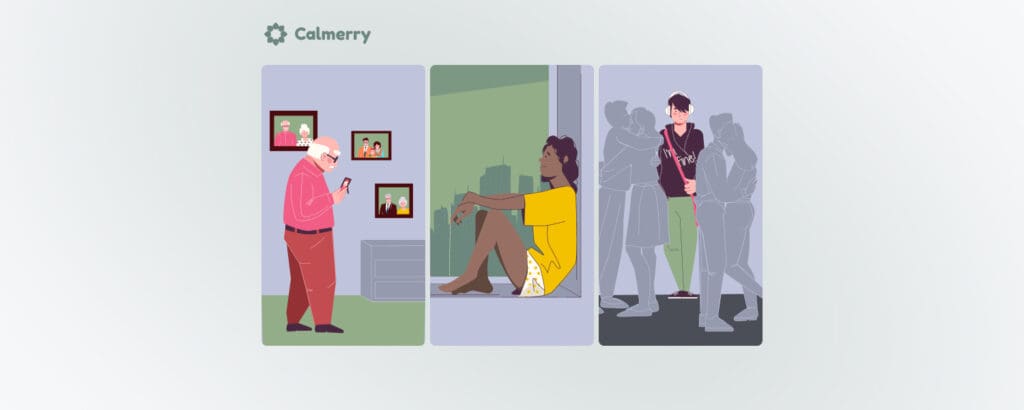How to Deal with Loneliness: 5 Strategies for Finding Connection and Joy

In this article
Many of us will have felt lonely at some point in our lives. Loneliness might last just a few hours, or several days, or linger for years.
Research by the Harvard Graduate School of Education has shown that an epidemic of loneliness is being seen across America following the coronavirus pandemic.
So, how can we find connection and joy when we feel lonely?
Our 5 strategies will show you how to overcome loneliness.
What is loneliness?
Loneliness is a subjective feeling and a deeply personal experience. It’s often felt when you do not have as much social contact as you might like.
But it can also occur because of the complex social or personal challenges, or if the social contact you do have lacks quality or doesn’t feel meaningful.
Loneliness can be felt at any time, but you may notice a pattern to this feeling.
For example, you may feel lonelier in the evenings, at weekends, or during the holiday seasons. Loneliness may feel worse in the winter months when it’s harder to get outside or during summer when other people might be on vacation.
And acute loneliness may last for a few days, whereas chronic loneliness can persist for years.
Alone vs. lonely
It is important to remember that being lonely is not the same as feeling alone. Some people who live alone or are socially isolated may never feel lonely.
In fact, many people enjoy solitude and look forward to having time alone.
But this is not everyone’s experience, and learning to make the most of having time to yourself can take some practice.
For other people, feeling lonely is not related to being alone. You might be surrounded by family or friends while still experiencing extreme feelings of loneliness.
This subjective experience is just as valid as that of someone who feels lonely due to social isolation.
You might feel lonely for many reasons despite being surrounded by a friend or family member. For example, you may:
- Feel your friendships lack depth
- Have strained family relationships
- Find that the time you spend with others feels functional rather than enjoyable.
Signs of loneliness

Loneliness can feel different for everyone. But there are some symptoms and signs you might notice, including feeling:
- A persistent sense of isolation, even in the presence of others
- You have no close family or friends
- Unhappiness due to social isolation
- A lack of interest or loss of motivation
- Heightened stress levels
- Emotional or physical exhaustion
- A persistent sense of emptiness
- A deep longing for meaningful connections and intimacy
- No one understands you or knows who you really are
- Others don’t fully grasp or empathize with your unique struggles
- Sense of exclusion and disconnection from others
- Pervasive depressed mood, characterized by feelings of sadness, hopelessness, or despair
- Heightened sense of hypervigilance and fear of being hurt or betrayed
- You don’t have deeper connections with friends or family
- Isolated or separated from others at work or home
- Disengaged in your professional or personal life
- Relationships or friendships are unfulfilling
- Conversations with others are only surface level, without deeper discussions of issues that are important to you
- Increased vulnerability to negative thoughts and self-criticism
- Self-doubt or that you are not enough
- Your effort with others is not heard, seen, or reciprocated
How does loneliness impact your health?
Loneliness can also have negative impacts on your health. Research has highlighted that lonely adults aged 50 or over may be at greater risk of serious health conditions, including: [1] Donovan, N. J., & Blazer, D. (2020). Social isolation and loneliness in older adults: Review and commentary of a National Academies report. American Journal of Geriatric Psychiatry, 28(12), 1233–1244. https://doi.org/10.1016/j.jagp.2020.08.005
- Dementia
- Heart disease
- Stroke
- Depression symptoms
- Anxiety and other mental health problems
When you feel lonely, you may find you have difficulty sleeping, your appetite goes up or down, you spend a lot of time watching TV or scrolling on your phone, or you feel that you are living with a constantly unfulfilled state of mind.
If left unaddressed, loneliness can affect your emotional and physical health, so it is extremely important to understand why you might be experiencing it and what you can do to stop feeling lonely.
Why am I so lonely?
We know that loneliness can occur even if you are surrounded by other people. Identifying the likely cause of your own loneliness is a great first step in managing the way you feel.
Older adults are likely to be socially isolated, which may increase the risk of loneliness.
However, people who are feeling lonely may feel so due to several diverse and complex causes, including:
- Chronic illness – this may limit how much you can socialize or how easy it is to join others in social activities
- Mental health conditions – loneliness and mental health conditions often intersect, creating a complex relationship. Conditions such as depression, anxiety disorders, and post-traumatic stress disorder (PTSD) can intensify feelings of loneliness. Conversely, chronic loneliness can contribute to the development or exacerbation of mental health issues
- Hearing loss – if you find it hard to hear what is going on, you might struggle to build meaningful connections with others
- Loss of family or friends – losing those who are close to you due to relocation, friendships drifting apart, family estrangement, or death can leave a huge gap in your life
- Living alone – you may go days without seeing or speaking to anyone else
- Relationship break-ups or divorce – if you are lonely and single, you may be coping with the loss of your ex-partner as well as any of their friends or family who you may no longer see
- Unhappy or unfulfilling relationships – even when you have a partner, you may be feeling lonely in a relationship
- Moving to a new city, state, or country – it can be hard to get to know new people
- Working from home – you may mourn the loss of colleagues or the office environment
- Changing jobs or schools – feelings of isolation may occur until you can forge new friendships and relationships
- Cultural Influences – cultural norms, societal expectations, and traditions may shape individuals’ social interactions and sense of belonging. Furthermore, language barriers, immigration, and acculturation challenges can also contribute to feelings of loneliness and isolation. [2] Fritz, M. V., Chin, D., & DeMarinis, V. (2008). Stressors, anxiety, acculturation and adjustment among international and North American students. International Journal of Intercultural Relations, 32(3), 244–259. https://doi.org/10.1016/j.ijintrel.2008.01.001
- Discrimination – experiencing prejudice, bias, bullying, or being socially excluded can lead to a sense of isolation and disconnection.
- Trauma and loss – experiencing traumatic events or significant losses, such as the death of a loved one, divorce, or separation, can leave individuals feeling isolated and struggling to connect with others.
For many people, feeling lonely is not related to being alone. And any experience of loneliness is valid.

Tips to help manage loneliness and find joy
Once you can identify when and possibly why you are feeling lonely, you may wonder what to do to feel less lonely.
Our list of practical tips will help you overcome loneliness and find joy in your life. These strategies are also a great starting point for boosting your mood if you feel isolated.
1. Learn more about being comfortable in your own company
If you fear being alone, it’s time to start addressing it. Indeed, if you’re feeling lonely and depressed, it can be hard to stop these feelings from becoming a downward spiral of upset.
However, finding ways to feel comfortable when you’re alone is one of the best ways to avoid isolation leading to loneliness.
You’re your best friend. When you’re alone, spend this time thinking about hobbies, events, or activities you enjoy and might like participating in.
This can range from simple activities like reading a new book to bigger events like booking a trip to see your favorite singer. Some people find that spending time with pets and other animals combats loneliness.
Realizing that it is possible to enjoy life when you are on your own is a big step forward.
2. Make new connections
If you are someone who needs a human connection to avoid feelings of loneliness, think about ways to make new connections with others.
You can return to work in the office, join a sports team, get in touch with people online, join an online community filled with people who share your interests, or volunteer in a local community center. This will help you feel more connected and reduce feelings of loneliness.
3. Try and open up to people you know
If you have social connections, but they feel shallow, consider talking to your family or friends about your desire for deeper conversations with them. Being honest about how lonely and sad you feel may help others understand what you need from them.
In some cases, you may find that your family has had their own anxieties about being brave and opening up about their thoughts and feelings.
Starting a conversation by saying, “Hey, I feel lonely all the time. Can we talk?” might sound scary, but it could help you build stronger relationships with others long-term and feel more connected.
4. Look after yourself
While you begin to manage loneliness, it is important to take care of your mental and physical well-being.
Vital self-care, such as eating well, prioritizing sleep, getting regular exercise, making time for hobbies, and restful activities, can help you feel better prepared to manage loneliness.
If you know that loneliness affects you at a certain time of the day or year, try to make plans in advance to help you feel less alone at this time.
5. Try not to compare yourself to others
Social media makes it easy to see what friends and family are doing. But this can make you feel low or inadequate if your life might seem to fall short of everyone else’s when compared to those positive photos on social media.
Rather than making comparisons, write down a list of all the positives in your life. If you see someone else doing something that you could enjoy, consider whether trying something similar could bring excitement or happiness to your life.
6. Take it slow
Don’t put much pressure on yourself; instead, take small steps on your way to recovery. Give yourself time and space to think about what you want to get from your relationships with others and how you want to interact with them so as not to feel lonely.
This practice will help you hear your inner self, and that is alone a big step to improve your well-being and ease loneliness.
7. Try talking therapies
Talking therapies can be very helpful in reducing feelings of loneliness.
Therapy is a safe place where you can easily share your feelings with a professional and get no judgement but support and insights about the causes that lead to the way you feel.
One such therapy is Cognitive Behavioral Therapy (CBT), which helps to identify the possible situations that resulted in loneliness and find strategies to improve your connections with other people.
A therapist can offer valuable guidance to help you feel more supported and less isolated.
How to be single and happy?
More and more people are embracing the benefits of being single, and it turns out there are a lot of upsides to being solo.
Here’s how to feel better about being single, whether you are looking for a relationship or not:
- Use your solo time to learn more about yourself
- Listen to science, not self-doubt
- Fill your time with things that bring you joy
- Think about what you have, not what you’re lacking
- Consider talking to a professional
Seek professional support
You should remember that the activities mentioned above can help you ease loneliness. But to overcome these feelings, you might need professional help.
Seeking professional support can be immensely valuable in navigating and addressing the complex challenges and experiences associated with loneliness.
Talking to a counselor offline or online can help you understand how you feel and how you can cope with loneliness in your unique case.
FAQ
What is loneliness, and how is it different from solitude?
Loneliness is usually a feeling of sadness that can be related to a long separation from your loved ones, moving, working from home, and lack of support. In contrast, solitude is a conscious choice to spend time alone.
People often use this time for self-analysis, setting goals for the future, or just to enjoy their own company.
What are the main causes of loneliness?
Loneliness can appear due to several factors, like feelings of isolation, life transitions, lack of support and connections, social media, depression, or loss of a close person.
All these causes can make us feel emotionally distant, which leads to feelings of loneliness.
How can I tell if my loneliness is temporary or chronic?
Temporary feelings of loneliness are short-lived. It is usually caused by some event or change and improves when you socialize with others.
In contrast, chronic loneliness can last for months or years. It has negative impacts on your mental health and is quite difficult to overcome without the help of professionals.
How do social media platforms influence feelings of loneliness?
Social media can increase your feelings of loneliness by comparing yourself to others.
For example, you may think that your life isn’t as colorful and exciting as the people you follow. This practice can lead to withdrawal and, thus, to the feeling that you’re lonely.
What self-development practices help to combat loneliness?
Self-development practices, like journaling, mindfulness, physical activity, or volunteering, can help us feel less isolated. These simple activities can create strong connections with yourself and others, so it’ll be much easier to combat loneliness.
Can someone be happy while feeling lonely?
The short answer is yes. Many people enjoy the time they spend alone. To get the most out of it, dedicate this time to learning more about yourself, meditating, or just doing the things that make you happy.
How can I support a loved one who feels lonely?
To support someone important to you when they feel lonely, the most important thing is to show understanding and listen to them if they want to share their feelings.
Offer to spend the time together doing something you both love.
Sometimes, people who experience loneliness need time to recover, so it’s important not to put pressure on them and let them take their time.
What professional treatments are available for loneliness?
Cognitive Behavioral Therapy (CBT), group therapy, or community activities are great options to reduce loneliness. Licensed specialists can help you identify the causes of feelings of loneliness and show strategies to combat them.
Engagement in social events with others can help you create meaningful bonds with like-minded people, helping you to feel more connected.
How do I cope with loneliness after a breakup or loss?
Losing or breaking up with a loved one is always hurtful and traumatic; often, it makes us close in our room and grieve. However, as soon as you feel ready to connect with others, think of activities that make you happy, go for a walk to make new in-person connections, or join a group to participate in.
Sharing common interests with others can ease feelings of loneliness.
Are there any benefits to loneliness, and how can I recognize them?
Loneliness is not always a bad thing; it has its advantages. You may use the time when you feel lonely for self-analysis or to think about your life goals. Loneliness can also strengthen our relationships with others.
For example, you may value your connections and closeness with your loved ones more after some time spent separately.
The time you spend alone can help you become more independent. Use this time to enjoy your own company and take care of your well-being.
Final thoughts
If you regularly think, “Oh, I feel so lonely…”, many other people understand what you are going through.
Loneliness is increasing in America, but there are plenty of strategies you can try to reduce feelings of detachment and find peace, acceptance, and happiness in your own company.
Calmerry has licensed and experienced counselors who can help you explore personalized strategies to manage loneliness and develop coping skills.
Online therapy can be a great option to feel less lonely and more connected. Choosing online therapy means you can access the support you need at a time and location that is convenient to you.
Donovan, N. J., & Blazer, D. (2020). Social isolation and loneliness in older adults: Review and commentary of a National Academies report. American Journal of Geriatric Psychiatry, 28(12), 1233–1244. https://doi.org/10.1016/j.jagp.2020.08.005
Fritz, M. V., Chin, D., & DeMarinis, V. (2008). Stressors, anxiety, acculturation and adjustment among international and North American students. International Journal of Intercultural Relations, 32(3), 244–259. https://doi.org/10.1016/j.ijintrel.2008.01.001
online therapy
live video session


